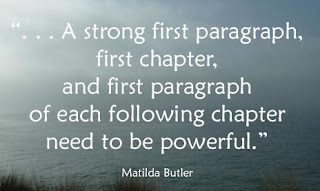“Many
beginning writers believe
the
writing process requires great confidence
and
unfaltering courage.
I’ve
learned the writer’s journey requires
the
ability to admit we’re not brave
or
altogether perfect.
As
Christian writers, we fare well
if
we possess the wisdom to ask God
for
the strength and discipline needed
to
buckle down
and
type the words He gives us.”
Lord,
thanks for this new year and the fresh opportunities You offer us to write our
memoirs.
Remind
us that you’ve given each of us life and therefore you’ve given each of us a
story to share with others.
Help
us believe that writing our stories is not a hobby—it’s a ministry! You’ve told
us to always remember what we’ve seen You do and to tell our children and
grandchildren (Deuteronomy 4:9).
And
Jesus said, “Go back to your family and tell them all that God has done for
you” (Luke 8:39).
Your
Word urges us to tell everyone about the amazing things You do, for You are
great and most worthy of praise (1 Chronicles 16:24-25).
Convince
us that we should not look down on small beginnings—and that You, O God,
delight to see our work begin (Zechariah 4:10). Lord, give us the courage to begin.
Ignite
a fire in our hearts to work as disciplined, intentional writers, committed to
finishing our memoirs.
Take
away our fears, Lord, and help us compose our stories with confidence, knowing You
will use our efforts to point readers to You and Your love and Your goodness.
Motivate
us to make time to reflect—to think back and ponder and examine—and to search
for Your holy fingerprints, footprints, and heartprints. Enlighten us so we
connect the dots and notice connections we overlooked in the past.
Enable
us to see Your big picture, to recognize what You were doing to bring about
Your best for us—often not the easiest, but the best.
You
have entrusted our stories to us. You want us to tell others so they can see
how You fought our battles alongside us, You brought healing and hope—not
because of who we are, but because of who You are! Not because we are so great,
but because You, God, are so great.
You
have called us to a sacred task so inspire us, dear Lord. Help us find joy in
the process of writing, of retelling our “God-and-Me” stories. Place in us a
desire to learn to write well, with clarity and grace, and to persevere through rewriting and polishing and editing and publishing and marketing. Bring
good people alongside us to accomplish all that.
Help
us to embrace fulfillment and purpose and satisfaction in doing what You’ve
called us to do.
Lord,
You can do far more than anything we can request or imagine (Ephesians 3:20) so
we humbly ask: Please equip us to write the stories You’ve given us. And once
they’re in print, use them to accomplish Your good purposes.
Help
us remember: All of this is not because we’re so great, but because God, You
are so great!
Not
because of who we are, but because of who You are!
May our memoirs and lives bring honor to You,
our glorious God.









